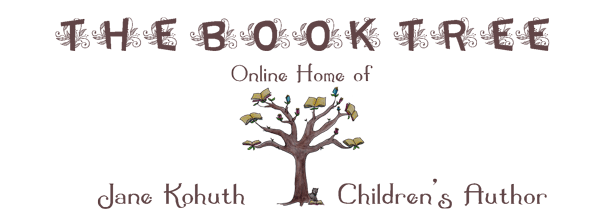
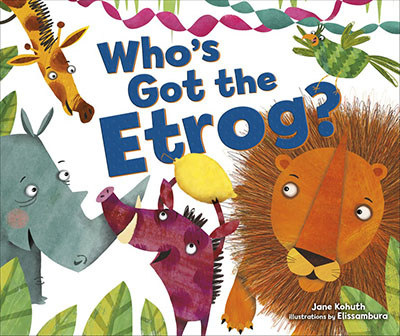
Who's Got the Etrog?
Picture Book
Kar-Ben, Fall 2018
ISBN Hardcover 978-1-5415-0966-5
ISBN Papberback 978-1-5415-0967-2
Auntie Sanyu builds a sukkah in her Ugandan garden. Curious wildlife -- Warthog, Lion, Giraffe, Rhino, and other animals come to celebrate the Sukkot holiday. They all want to shake the lulav and smell the etrog, but Warthog wants the etrog all for himself. Will everyone lose their temper? Or can Auntie Sanyu's niece Sara solve the problem?
The Abayudaya community (Jews of Uganda) is the setting for Who's Got the Etrog?, a Succot picture book by Jane Kohuth, illustrated by Elissambura (who does a fantastically bristly lion, as well as a fine, wrinkly Aunty Face). Auntie Sanyu, overturning the stereotype of an elderly Jewish relative, builds a succah in her garden . . . Repetition is used to good effect in building up anticipation and readers will learn about adverbs as well as manners. --The Jewish Chronicle
The delightful rhythm of the rhymes and the African-inspired artwork make this tale a perfect read-aloud in the sukkah or anywhere else. --Jewish Journal
Small children will love the parade of bright jungle animals and the book’s lilting poetry. The issue of selfishness, and the chaos it can create, can easily be discussed with young readers or listeners. --Jewish Book Council
To purchase this book from IndieBound click here.

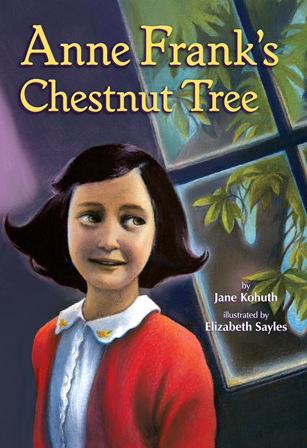
Anne Frank's Chestnut Tree
NCSS Notable Social Studies Trade Book for Young People
Picture Book
Random House, September 24th, 2013
ISBN Hardcover 9780449812556
ISBN Paperback 9780307975799
Hidden away in their Secret Annex in Amsterdam during World War II, Anne Frank and her family could not breathe fresh air or walk under the blue sky for years. But through an attic window, Anne could see the branches of a tall chestnut tree. This small glimpse of nature gave Anne hope and courage. It inspired her writing, which in turn has inspired the whole world.
This book has been the biggest writing challenge I've faced so far. How could I tell Anne Frank's story for the youngest of independent readers? How could I honestly depict Anne Frank's sadness, fear, and hope? For me, Anne's devotion to nature, and in particular to the chestnut tree that grew outside the Secret Annex, was a way to delve into her story that I hadn't seen before. I hope that I have done justice to Anne's ideas and beliefs and that I've presented them in a way that is both truthful and accessible to young readers.
One sentence in Anne Frank’s diary reads:“I firmly believe that nature can bring comfort to all who suffer.” Nature, as represented by a chestnut tree outside an attic window in the Secret Annex, serves as a continuing image for this beginning chapter book. . .The presence of the tree throughout Anne’s life in hiding not only gives her a sense of peace but also provides young readers a respite from her ordeal . . . Anne’s story comes full circle when, after the chestnut tree is blown down in a storm in 2010, its fruit is used to plant other trees, “inspiring people to see the world as Anne did.” --Horn Book Magazine
"This easy-reader introduction to Anne Frank’s life effectively uses [the] theme of nature to offer an abbreviated and accessible overview of Anne’s tragic and remarkable life. The summary of life events is appropriately succinct without being oversimplified; major historical factors are included, anti-Semitism is explained . . . and the fear of living in hiding is effectively presented. The tree is an effective central symbol in a story about a young adult holding onto hope, and occasional quotes add further depth to the narrative. Sayles’ acrylic paintings offer plenty of visual support for the story . . . this would be a useful text to have on hand for struggling upper-elementary readers involved in Holocaust units or those needing an accessible title for a biography assignment. --Bulletin of the Center for Children's Books
"This brief but powerful introduction to Anne Frank’s life uses a format suitable for both newly independent readers and older readers who need simplified text. . . . The context of the Nazi era and the basic facts of Anne’s life are skillfully summarized. . . .Touching illustrations in muted tones augment the portrayal of Anne’s character and add to the atmospheric depiction of her life in the Secret Annex. A sensitive introduction to a young woman whose words continue to live. --Kirkus Reviews
Wow. A Step Into Reading book . . . that tackles, in 48 pages, the Anne Frank story. I read this aloud to my six-year-old, and I was impressed. We've talked in a limited way about World War II and the Holocaust, but it's hard to know how to approach these horrors with a child. This story isn't sugar-coated, but it also isn't overly brutal for younger readers. It's overall feeling (though it acknowledges that Anne Frank did not survive the war) is one of hope, focused on the chestnut tree Anne could see from the attic window of the Secret Annex. . . . I think for this age group, that makes it manageable for sensitive children. The message is hope, and the story brings Anne to life as a real child. This is a beautifully told story. --
On My Bookshelf Blog
To purchase this book from IndieBound click here.

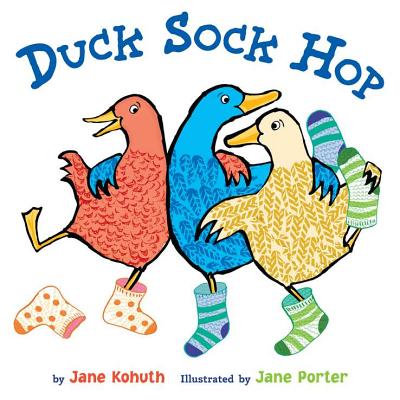
Duck Sock Hop
Picture Book
Dial, May 10, 2012
ISBN 9780803737129
Ducks pull socks from a big sock box. Socks with stripes and socks with spots . . . These ducks love their socks and they have them in every imaginable color and design. What should they do with them all? Hold a sock hop of course! A tongue-twisting, toe-tapping read-aloud sure to inspire dancing.
My talented teenage cousin Jeremy Stepansky composed the
Duck Sock Hop Bop and recorded it with his twin sister Maya. You can sing the text of the book to it -- give it a try! This would be a great addition to storytime.
One of my favorite ways to write is to begin with the sheer joy of words, rhythm, rhyme, alliteration, and assonance. I also like to look in a new way at ordinary everyday things, like socks, and make them feel extraordinary. I've drawn on my work in poetry to create vivid images and lively wordplay that's meant to make even the youngest audiences want to get up and dance.
Duck Sock Hop is Bank Street College of Education's Best Children's Book of the Year, 2013
Duck Sock Hop is one of Chicago Public Library's Best of the Best of Children's Books, 2013
Duck Sock Hop is one of New York Public Library's Top Ten Picture Book Read-Alouds of 2012
Duck Sock Hop is on the School Library Journal/Fuse#8 Production Blog's list of 100 Magnificent Children's Books of 2012
"In syncopated rhymes, this 'quackerjack' of a silly story will have toes tappin' and little hands clappin'. . . . With each spread, the dancing ducks get livelier and more animated, until the music stops and they all need new socks. The bright colors of the illustrations paint different patterns on each duck, entirely separate from their wild and crazy socks. Set against white backgrounds, they pop and rock with the rhythm of the rhymes. Ready made for wonderful fun at story time (sock theme, anyone?) or as one rollicking lap read, but be prepared, as kids will flock to hear it again. And after just one or two reads, they will be chanting along with the adults." --Kirkus Reviews
"This rhyming whimsy stars a crew of dancing ducks whose webby feet are made even happier by donning all kinds of sprightly socks, including 'Socks with stars and socks with moons,/ socks with cars and socks with spoons.'
Kohuth's (Estie the Mensch) verse offers plenty of read-aloud pleasure, giving readers the immense satisfaction of saying 'socks' and 'ducks' over and over. --Publisher's Weekly
"One list I've been playing with the idea of making would be a Great Read Aloud Picture Books of 2012. It's a little early in the season, sure, but I've already seen some great ones. Great ones like Duck Sock Hop by Jane Kohuth, illustrated by Jane Porter. There are ducks. They hop in socks. Best of all the book scans when it rhymes so reading it to the masses works. This is the book that introduced me to the idea that the phrase 'sock box' is fun to say. --Betsy Bird, A Fuse #8 Production
"There's something inherently fun about socks, a fact that has not been lost on this bunch of sock-wearing, dancing ducks. . . . Duck Sock Hop madness involves line dancing, accordion playing, and plenty of sock wear and tear ("Ducks drop crumbs, ducks spill juice. Socks get sticky, socks get loose"). Fortunately, there's a Duck
Sock Shop open to replenish supplies. The rhymes here are rollicking, alliterative, webbed-foot-tapping fun, and debut illustrator Porter's heavily lined, brightly patterned art extends the ducks' sheer joy. The funniest thing about the art? Giant socks housing skinny duck legs. This begs for a shoes-off storytime with toddlers doing some wiggling of their own. --Booklist
To purchase this book from IndieBound click here.

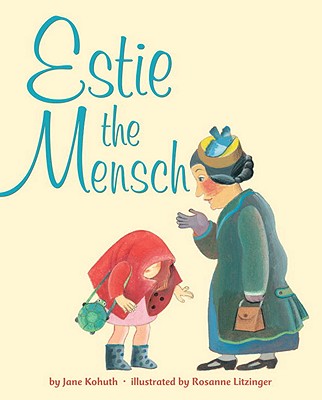
Estie the Mensch
Picture Book
Random House, August 23, 2011
ISBN 978-0375867781
What's a mensch, and why does her family keep telling Estie to be one? She'd much rather be a jungle cat, or an alligator, or an octopus. But if being a mensch means helping a new friend, then maybe it's not so bad after all?
To "be a mensch" is a Yiddish expression often used in the Jewish community. Literally, it means to "be a person," but when people say someone is a mensch, they're saying that person is filled with good qualities -- she's not just a person, but the best sort of person. Estie may come from a Jewish family, but anyone will be able to identify with her struggle to get along well with others while remaining true to herself.
"I LOVE Estie the Mensch! I found it could be useful for so many lessons. Most of all when teaching young people about how their behavior can be perceived differently by different people in different situations. I love the message that it is okay to be imaginative and be yourself at the same time as you are following rules and being polite. Estie's journey to this realization was quite charming and I know many kids who would relate completely. A 5 point story in my book!"
"This book is a great book for young children. It deals with a little girl who wants to be different and how people accept those who are different. It also would be a great introduction on appropriate behavior in different situations. With the great illustrations, it will be easy to hold a child's attention. The word "Mensch" is also introduced and can lead into a discussion about other cultures and religions along with tolerance of those who are different than us. I would give this book a 5 out of 5 rating."
"I truly enjoyed this story about a little girl not wanting to be a person. It reminded me of the times when my children were young and approached by people they didn't know. How true to just want to "cover your head like a turtle" and not deal with "it". Eventually, with the help from her family and extended family, she over comes this. In the process, the author takes us on a wonderful trip with Estie as she becomes many different animals with beautiful accompanying illustrations! Quite the little treasure of a book I'm sure many children will be able to relate to."
"Wonderful book! My first grade class loved the story. They even asked to hear it again! Some had the book in their hands during independent reading time. The theme of the story of being kind, good, and polite are attributes everyone wants their child to possess. Definitely a springboard for teaching manners, etc. The children scored it a 5/5 (me too)!"
- Picnic Basket Blog Reviewers (A blog for/by teachers and librarians), www.thepicnic-basket.com
"'Estie the Mensch' is a book about growing and changing, but it emphasizes that change is relative and that personality quirks and peculiarities can be part of the solution — instead of just oddities to be overcome. For while Estie's family has constantly tried to help her learn to interact with others, it is finally Estie that is able to make the leap to friendship. She discovers how wonderful it is to help someone who is feeling sad, and that she is able to do it in her own signature way.
With bold-colored illustrations and unusual scenes on every page, "Estie the Mensch" provides a great vehicle for addressing shyness, friendship, and the possibility everyone has for being the good person we all have inside.--
crackingthecover.com
"An odd, sweet tale of an exuberant kid who people keep telling to 'be a mensch'…and she proves herself to be one while also being true to her quirky self. Delightful old-fashioned but not stuffy art.."--
Marjorie Ingall
"Yiddish terms thoroughly embedded in English lose their genesis, their Jewish identity and, thus, our credit for adding to colorful speech. Not so in this fun picture book about a little girl who does not like people and actually prefers to be an animal herself. Through a charming, empathetic plot, the author brings the definition and connotations of the word "mensch" into sharp focus."--
Jewish Book World
"Litzinger's chalky illustrations have a tender, earnest quality, and Estie's red hair and green eyes give her animal impersonations pep in an offbeat story of gentle misbehavior, budding friendship, and close-knit family dynamics." -Publisher's Weekly
To purchase this book from IndieBound click here.

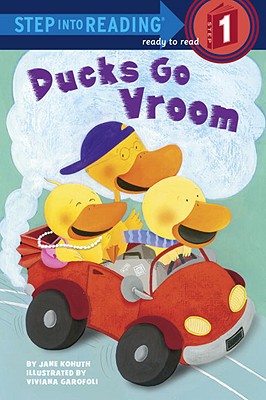
Ducks Go Vroom
Early Reader
A Step 1 Step Into Reading Title
Random House, February 8, 2011
ISBN 978-0375865602
Simple, funny action words and onomatopoeia describe three silly ducks' rather impolite visit to their Auntie Goose's house. This rollicking, tongue-twisting, rhyming story of three enthusiastic houseguests, paired with the lively artwork of illustrator Viviana Garofoli, is just the right speed for beginning readers.
Step 1 (Ready to Read) is for children who know the alphabet and are ready to read. Step 1 titles have big type and easy words, rhyme and rhythm, and picture clues.
Unlike many of my stories, Ducks Go Vroom began for me with the title. I'd been working in a library children's room and my head was filled with snippets of text like "ducks go quack" and "trucks go vroom." Switching it up a little made me giggle, and the story grew from there.
The American Library Association has named Ducks Go Vroom a Great Early Elementary Read
". . . the recurring physical details of cooking, eating, and clearing up are right on target for first readers. With a rhythmic beat and noisy, playful words that sound like what they mean, this Step into Reading title could be a cheerful, energetic read-aloud for young preschoolers, as well as readers on the verge of independence." --Booklist
"The fact that the ducks use a remote control to operate their TV and talk on a cell phone adds a contemporary touch to this otherwise timeless story. A solid choice for libraries needing entry-level readers." --School Library Journal
To purchase this book from IndieBound click here.











